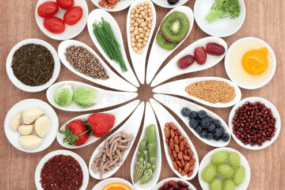
Our diet doesn’t just influence our physical health but also plays a significant role in our mental well-being. The connection between food and mood has been a topic of scientific exploration for many years, with increasing evidence suggesting that what we eat can directly affect our emotions, stress levels, and mental clarity. While the link between food and mood might seem intuitive, understanding the science behind it can help us make better dietary choices to enhance our emotional health.
In this article, we’ll dive deep into the fascinating connection between what we eat and how we feel, exploring the biological mechanisms involved, the foods that positively and negatively impact mood, and how to create a diet that supports both body and mind.
1. The Brain-Gut Connection: How Food Affects Our Mood
The brain and the gut are intricately linked through the gut-brain axis, a complex communication system that allows signals to be sent between the gut and the brain. This communication is essential in maintaining emotional balance and overall mental health.
Our gut contains trillions of bacteria, known as the gut microbiota, which play a crucial role in our emotional and psychological states. These microorganisms can influence neurotransmitters, the chemicals that help transmit messages in the brain. For example, a significant percentage of serotonin, a neurotransmitter associated with happiness and well-being, is produced in the gut. Therefore, the health of the gut microbiota can significantly impact mood and emotions.
Dysbiosis, an imbalance in gut bacteria, has been linked to various mood disorders, including anxiety, depression, and stress. The diversity of microorganisms in our gut, as well as their overall health, influences how our body processes and responds to emotions.
2. The Role of Nutrients in Mood Regulation
Our body requires various nutrients to function correctly, and certain vitamins, minerals, and fats are particularly vital for brain health and mood regulation.
- Omega-3 fatty acids: Found in fatty fish, flaxseeds, and walnuts, omega-3s are essential fats that contribute to the health of brain cells and are crucial for emotional stability. Low levels of omega-3 fatty acids have been associated with an increased risk of depression and anxiety.
- Vitamin D: This vitamin is produced by the body when the skin is exposed to sunlight, but it is also found in fortified foods and some fish. Vitamin D plays a role in the production of serotonin, the “feel-good” neurotransmitter. Low levels of vitamin D have been linked to mood disorders, especially depression.
- B vitamins: B vitamins, especially B12 and folate, are essential for the production of neurotransmitters. Deficiencies in these vitamins can lead to irritability, fatigue, and low mood.
- Magnesium: Found in leafy greens, nuts, and seeds, magnesium plays a role in regulating mood by helping the brain produce neurotransmitters like serotonin and dopamine. Low magnesium levels have been associated with anxiety and depression.
- Amino acids: These are the building blocks of proteins, and they are essential for producing neurotransmitters such as serotonin, dopamine, and norepinephrine. The amino acid tryptophan, found in turkey, eggs, and dairy, is a precursor to serotonin, which helps regulate mood and sleep.
The importance of a balanced diet rich in these nutrients cannot be overstated. Eating a variety of whole foods can provide the body with the vitamins and minerals it needs to maintain optimal brain health and emotional balance.
3. The Impact of Sugar on Mood
While it’s widely known that excessive sugar consumption can lead to physical health issues like obesity and diabetes, it can also have a significant impact on mental well-being. When we consume sugary foods or drinks, our blood sugar spikes rapidly. This spike is often followed by a sharp crash, which can lead to irritability, fatigue, and mood swings.
Moreover, the constant fluctuation in blood sugar levels can have a cumulative effect on our mood over time. Chronic blood sugar instability can contribute to feelings of anxiety and depression. For this reason, many experts recommend reducing the intake of processed sugars and refined carbohydrates and opting for complex carbohydrates like whole grains, fruits, and vegetables, which provide a steadier source of energy.
4. The Role of Protein and Complex Carbohydrates
Protein and complex carbohydrates have a stabilizing effect on blood sugar levels, helping to maintain steady energy throughout the day. Unlike simple sugars, complex carbohydrates are broken down slowly, providing a steady release of energy that helps prevent the mood swings associated with blood sugar crashes.
Protein-rich foods such as lean meats, beans, lentils, and tofu provide the amino acids necessary for neurotransmitter production, while complex carbohydrates, such as whole grains, sweet potatoes, and vegetables, provide fiber and essential vitamins that support brain function.
Eating balanced meals that contain a mix of protein, healthy fats, and complex carbohydrates can help maintain stable blood sugar levels, thereby supporting a more consistent mood throughout the day.
5. Foods that Boost Mood
Certain foods are particularly known for their mood-boosting properties, thanks to their nutrient composition. Here are some examples:
- Fatty fish: As mentioned earlier, omega-3-rich fatty fish like salmon, mackerel, and sardines are excellent for brain health and mood regulation. Omega-3 fatty acids have been shown to reduce symptoms of depression and anxiety.
- Dark chocolate: Dark chocolate, particularly with a high cocoa content, contains antioxidants that can boost mood. It also contains small amounts of caffeine and theobromine, both of which can have mild stimulating effects. In moderation, dark chocolate can improve mood and provide a temporary feeling of pleasure.
- Leafy greens: Vegetables like spinach, kale, and Swiss chard are rich in folate, which is vital for serotonin production. Low levels of folate have been linked to an increased risk of depression.
- Berries: Blueberries, strawberries, and raspberries are high in antioxidants, which help reduce inflammation and oxidative stress, two factors that can negatively impact mental health.
- Fermented foods: Foods like yogurt, kimchi, sauerkraut, and kefir are rich in probiotics, which help support a healthy gut microbiota. A balanced gut microbiota has been linked to better mood and reduced anxiety levels.
6. Foods that Harm Mood
Just as there are foods that can boost our mood, there are also those that can have a negative impact on mental health. These include:
- Processed foods: Highly processed foods, such as fast food, snacks, and sugary desserts, are often high in unhealthy fats, refined sugars, and artificial additives. These foods can cause inflammation, disrupt gut health, and lead to fluctuations in blood sugar levels, all of which can contribute to mood disorders.
- Caffeine: While caffeine can give us a temporary boost in energy, it can also cause anxiety, irritability, and difficulty sleeping, especially when consumed in excess. People who are sensitive to caffeine may experience more severe mood disturbances.
- Alcohol: Alcohol is a depressant that can disrupt sleep, impair judgment, and cause mood swings. While it may initially provide a sense of relaxation, excessive alcohol consumption can lead to feelings of sadness and anxiety.
- Refined carbohydrates: Foods like white bread, pasta, and pastries made from refined flour can cause rapid blood sugar fluctuations, leading to mood swings, irritability, and fatigue.
7. The Importance of a Balanced Diet for Emotional Health
The key to maintaining a positive mood and emotional well-being is a balanced diet that incorporates a variety of nutrient-dense foods. By focusing on whole, unprocessed foods that provide the body with the vitamins, minerals, fats, and proteins it needs, we can create a strong foundation for both physical and mental health.
A balanced diet should include:
- A variety of fruits and vegetables for essential vitamins, minerals, and antioxidants.
- Whole grains like brown rice, quinoa, and oats, which provide complex carbohydrates and fiber.
- Healthy fats from sources like avocados, nuts, seeds, and fatty fish.
- Lean proteins such as chicken, turkey, tofu, and legumes, which provide amino acids needed for neurotransmitter production.
By making mindful food choices, we can improve both our physical health and our emotional well-being, fostering a more positive and balanced life.
8. How to Use Food to Improve Mood
Making small changes to your diet can have a profound impact on your mood and emotional health. Here are a few tips to get started:
- Prioritize nutrient-dense foods: Focus on whole foods that provide a variety of vitamins, minerals, and antioxidants. Aim to include a rainbow of fruits and vegetables in your diet to ensure you’re getting a wide range of nutrients.
- Eat balanced meals: Try to include a source of protein, healthy fat, and complex carbohydrates in every meal. This combination will help stabilize blood sugar and provide steady energy throughout the day.
- Avoid processed sugars: Reduce your intake of sugary snacks, sodas, and processed foods. Instead, opt for natural sources of sweetness like fruit or dark chocolate in moderation.
- Stay hydrated: Dehydration can lead to fatigue, irritability, and poor concentration, so make sure to drink plenty of water throughout the day.
- Incorporate mood-boosting foods: Include foods like fatty fish, leafy greens, berries, and fermented foods regularly in your diet to support brain health and emotional well-being.
- Mind your gut health: Since a healthy gut microbiota is essential for good mental health, consider incorporating probiotic-rich foods like yogurt, kimchi, and kefir into your meals.
Conclusion
The connection between food and mood is undeniable. The foods we consume can have a significant impact on our emotions, mental clarity, and overall emotional well-being. By making informed dietary choices that prioritize nutrients essential for brain function and mood regulation, we can support both our body and mind. With a balanced diet, we can better manage stress, reduce anxiety and depression, and enhance our overall mental health, helping us lead happier, healthier lives.























